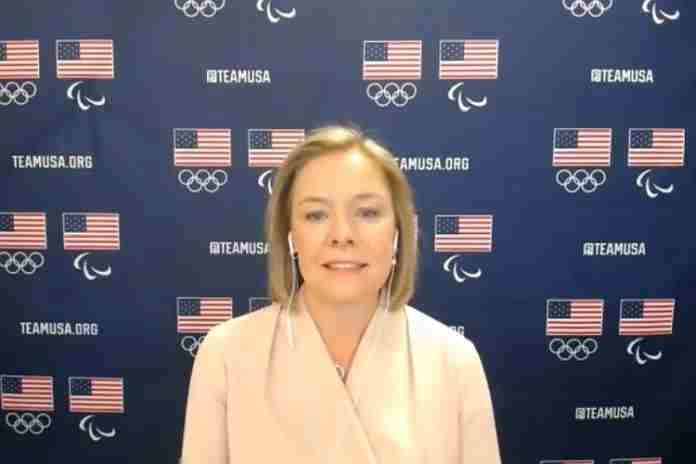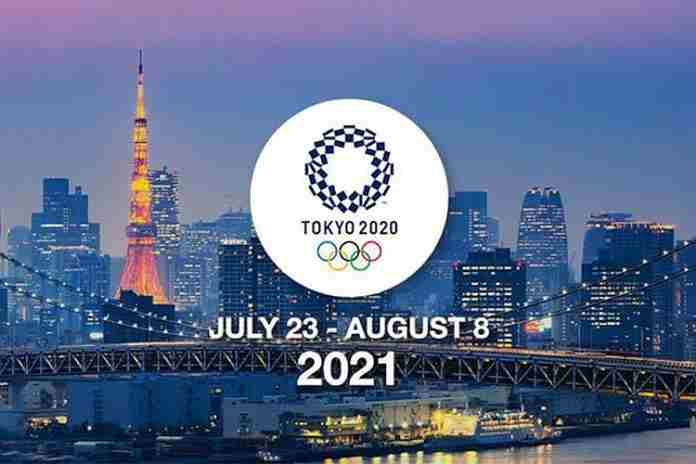(★ Friends: Fantastic! We now have 25 donations received toward the new bill for server and support costs; with the overage from the prior request, we’re at 73% of our goal. This isn’t the easiest time to ask, but if you would like to help, please donate here. Your enthusiasm is the reason this site continues. ★)
Well, 2020 was a terrible year for a lot of people. Let’s all hope that 2021 is better – a lot better – and the United States Olympic & Paralympic Committee leadership outlined the priorities for next year during a telephonic news conference on Monday.
USOPC Chair Susanne Lyons opened the discussion by noting that the USOPC will welcome six new Board members in January and that while the designated “athlete” members of the Board have been increased from three to five, there are actually nine current or former athletes now part of the 19-member Board.
Chief executive Sarah Hirshland followed with a detailed operations report, which included a specific list of where the focus is now. There’s nothing too surprising here, but worth checking out:
“We looked at the ‘21-22 calendar years and as you all know, our Board, at the end of 2019 approved a five-year strategic plan. We’ve now concluded the first year and now are planning for the second and third years of that. As we look ahead to 2021, we feel very good about the progress that we made in the first year of that plan and now our commitment as we go forward really focuses in five key areas.
[No. 1] “First and foremost, executing on the Tokyo and Beijing Games with excellence is and will always be a high priority for us and with three Games in the next four-year period, it will require incredible attention and dedication from our organization and the [National Governing Bodies] and broader U.S. Olympic and Paralympic community overall to ensure that those Games are wildly successful for all who are part of the U.S. delegation.
[No. 2] “The second is advancing the empowerment of Team USA athletes, whether this is through continued increases in athlete representation, now dropping from the USOPC governance level down into the National Governing Bodies and other organizations and committee-level appointments, there is still ample opportunity to implement increased athlete representation in the Movement and we’re focused on that work.
“Selection procedures and the qualification procedures for the Games will be a top priority, as will ensuring that the grievance process for athletes is clear and well understood, and provides a fair opportunity for all athletes.
[No. 3] “Our third priority will be supporting the effectiveness of our National Governing Body partners, whether this is focused on pipeline and really understanding and acknowledging and recognizing some of the threats to that pipeline that we’re seeing, particularly through the NCAA, but also at the grass-roots level, as the pandemic impacts sport across this country.
“But also in revenue generation, and ensuring that the NGBs have every opportunity to be strong financially, and to generate the revenues they need to do the great work that they do.
[No. 4] “Our fourth priority: serving as an engaged partner and an influential voice, both in the domestic and international movements. Certainly, it is not lost on us that there is a continued priority in the construction and development of the L.A. ‘28 organizing committee. We will continue to work very closely with them, the development of that organization and the plans for the L.A. ‘28 Games. Whether it’s the Congressional commission that comes on the heels of the enactment of the new Empowering Olympic, Paralympic and Amateur Athletes law – the Congressional commission coming out of that – something we are prepared to support and commit the time, energy and resources to assuring that the commission is wildly successful as well.
“And finally I would just comment on our motivation and goal to be a leader in our Movement but also in the country around issues of diversity, equity and inclusion. It’s an important opportunity for us and we feel very good about the work that’s happening in our organization and in our community in support of these important issues.
[No. 5] “Our last priority is to be good stewards of our people and our financial resources. We’re committed to running the organization with operational excellence and discipline, transparency and accountability, while at the same time being very focused on taking care of our people and being a great environment in which our team members and the athletes and those in our community can all thrive and be successful.”
On the “influential voice” priority, Lyons noted that the USOPC has been playing a helpful role in the anti-doping arena:
“The USOPC specifically is trying to take, as much as we can, a collaborative approach and work in some ways as both a mediator and an influencer with the [U.S. Office of National Drug Control Policy], with [U.S. Anti-Doping Agency], with [World Anti-Doping Agency], and with the [International Olympic Committee]. …
“[W]e don’t actually fund WADA for example – the USOPC does not – so some of our levers are not really so much financial as they are influential. And what we’ve decided to do is to increase, I guess, the volume on our concerns about the necessary evolution that has to happen to get to the highest level of transparency, fairness and rigor in how doping is governed around the world and we’ve given our thoughts and ideas to WADA on things they can do and perhaps incorporate into their governance work.
“So we will try to continue to work as a positive partner around the world, but certainly we’ll stand up for our athletes and make it clear that anything less than the highest efforts of integrity to keep sport clean will not be accepted.”
It will be fascinating to follow how much effort the USOPC devotes to being an influencer in world sport. Other National Olympic Committees – using government-provided funds – have spent liberally in trying to recruit, promote and elect (or have appointed) candidates to International Federation boards, councils and committee posts, as well as auxiliary organizations such as WADA, the Court of Arbitration for Sport and others. This is a nearly silent – and highly effective way – to obtain quality intelligence and exert subtle influence into the multitude of deliberations which occur daily in international sport.
Hirshland’s checklist is a good one to refer to again in a year’s time. She noted that the USOPC’s own finances are solid, but there will be a lot of work ahead to repair the finances of numerous National Governing Bodies as well as preparing for the Beijing 2022 Winter Games just six months after the Closing Ceremonies in Tokyo next August.
You can receive our exclusive TSX Report by e-mail by clicking here. You can also refer a friend by clicking here, and can donate here to keep this site going.
For our 526-event International Sports Calendar from October 2020 to June 2021, by date and by sport, click here!


























